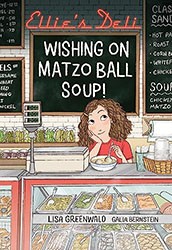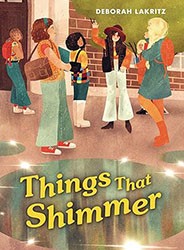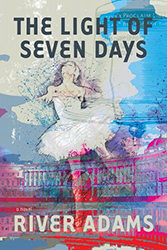Nolie and Linden Beck are sisters who are close enough in age to almost be twins — but by middle school, they seem to have little in common. They live on New York City’s Upper West Side with their hardworking mother, a nurse, and their father, the owner of Joey’s Shoes, a business that has long been in their family. Both parents are supportive and loving, and the girls are also fortunate to have their grandmother in the neighborhood. However, as the new school year begins, Nolie begins to feel increasingly alienated from her family and from her former best friend. Through it all, Caroline Gertler depicts Nolie’s search for self with sensitivity, positioning her dilemma within the framework of Jewish life.
Nolie assumes that the path to self-discovery is simple for those who have an overwhelming passion, as does her sister. Linden, to be sure, has been obsessed with ballet from a young age. She performs with the New York City Ballet and is about to audition for a starring role in The Nutcracker. While Nolie considers herself bright, she has never found one goal that attracts the kind of attention that she believes is unfairly awarded to Linden.
When Nolie’s best friend, Jessa, forces her into a superficial program of changes in an attempt to polish her rough edges, the girls’ former closeness is damaged beyond repair. Even Grandma’s unconditional acceptance is not enough to sustain Nolie’s faith in herself. Gertler captures Nolie’s anguish without exaggerated drama, choosing to focus instead on the small insults and self-doubt that plague many tweens. What’s more, Gertler’s attention to specific New York locations affords the novel a convincing specificity.
And then there is Linden. In addition to the demands of ballet practice and performance, she is aware of the potential scrutiny she faces as a Jewish girl taking the lead in an iconic Christmas event — and of the irony that she is preparing for her bat mitzvah at the same time. Although she is proud of the fact that other Jewish ballerinas have paved the way for her, she also discovers that ordinary competition and toxic antisemitism add to the anxiety she already suffers.
Nolie also contemplates her Jewish identity. Conversations with her grandmother relay a hazy background of prejudice and the need to be accepted in American society. Gertler describes Nolie’s memories of first learning that she is Jewish: “It sounded like a funny word … Like a breeze whistling through your lips … as she’d gotten older, Jewish had sometimes felt like a dirty word — something you didn’t want to identify about yourself in public.” The author suggests that antisemitism is not always obvious, and that cultivating a positive relationship with one’s own Jewish identity may be a complicated, ongoing process.
Nolie ultimately learns it is necessary to both change and affirm the past. “Some things might break,” she says, “but other things, or even the broken things, came together in new ways.” By story’s end, Nolie comes to define who she is, and how to piece together the contradictions that challenge her.
Emily Schneider writes about literature, feminism, and culture for Tablet, The Forward, The Horn Book, and other publications, and writes about children’s books on her blog. She has a Ph.D. in Romance Languages and Literatures.





